| physiological ecology group | ::: | institute | ::: | university | ::: |

| Prof. dr hab. Joanna Rutkowska joanna.rutkowska@uj.edu.pl |
Inst. of Environmental Sciences Jagiellonian University Gronostajowa 7, 30-387 Kraków Poland tel. + 48 12 664 51 99 fax + 48 12 664 69 12 |
||
home |
+ projects |
publications |
students |
links |
bio |
Ecophysiology of learning
Our world is currently facing an increase in climate unpredictability and short-term variability. Thus, it becomes increasingly relevant to study whether animals are able to cope with those changes. The aim of this project is to study the effect of temperature unpredictability in different time scales on learning efficiency in a model songbird. Specifically, we use zebra finches to answer the questions such as: a) Does living in a variable ambient temperature entails physiological costs that negatively affect learning? b) Are different types of learning affected by the variable temperature in the same way? c) Can parents alleviate the effect of the ambient temperature on their offspring? d) Whether offspring which develop in variable conditions are better in adapting to the prevailing environmental conditions experienced in the adulthood?
Cooperation: ChuChu Lu, Maëlle Lefeuvre (Institute of Environmental Sciences), Carlos Botero (Washington University in Saint Louis).
Project financed by the National Science Center.
Synthesis and meta-analysis of paternal effects
Although in each sexually reproducing organism an individual has mother and father, non-genetic inheritance has been predominantly studied in the form of maternal effects. In recent years development of new theoretical, computational and empirical tools resulted in more interest and new insights into paternal effects. Yet, there are virtually no systematic/meta-analytical studies that would summarize knowledge on paternal effects. During my sabbatical year in Sydney I carried out a quantitative research synthesis of the field of paternal effects. I also performed meta-analysis on the relative strength of paternal compared to maternal (and synergistic) dietary effects on the offspring performance. Both manuscripts are in preparation.
Cooperation: Shinichi Nakagawa, Malgorzata Lagisz & Russell Bonduriansky (University of New South Wales)
My sabbatical was founded by the Polish National Agency for Academic Exchange.
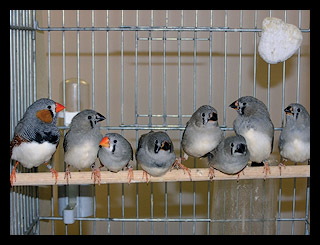 |
Zebra finch family photo: Joanna Rutkowska |
Maternal hormones and offspring gene expression
We study causes and consequences the differential gene expression in male and female offspring. So far, we found that male embryos grow faster than female embryos even before gonadogenesis. This is most likely achieved by the overexpression of the growth hormone receptor gene and three other genes responsible for cell cycle regulation and metabolism, all of them located on the Z chromosome (Tagirov & Rutkowska 2014). Current experiments look at the effects of maternal hormones on sex-specific gene expression in the offspring in zebra finches.
Cooperation: Makhsud Tagirov, Szymon Drobniak, Dorota Lutyk.
Project financed by the National Science Center.
Physiology of aging: integrating over different levels of biological organization
In this project we use three distinctive age classes (0.5, 2 and 4.5 years old birds) of zebra finches. So far, we demonstrated that vertical flight performance declines with age (Labocha at al. 2015). The ultimate aim of this project is to link individual performance with tissue-specific aging.
Cooperation: Ulf Bauchinger, Edyta Sadowska, Mariusz Cichoń, Marta Labocha.
Sexy non-significant results
In evolutionary biology, there are several well-established opinions that need new insight and potential revision. So far, with meta-analytical help of Shinichi Nakagawa and support from other co-authors, I did two studies of that kind. Firstly, we found that commonly accepted view of gradual shortening of the W chromosome over evolutionary time is not supported in birds (Rutkowska et al. 2012). Secondly, we revealed lack of egg sexual size dimorphism across avian species (Rutkowska et al. 2014). More non-significant results coming soon!
Cooperation: Shinichi Nakagawa, Małgorzata Łagisz (Otago University), Anna Dubiec (Polish Academy of Sciences).
Evolutionary cost of immunocompetence in birds
We study the significance of genetic and maternally transmitted components of immunity. Experiments are conducted on zebra finches using non-pathogenic antigens that induce immune response. So far, we found that the magnitude of maternal immune response negatively correlates with offspring viability (Rutkowska et al. 2011). We also found that eggs bearing male and female offspring differ in maternal antibody content and we were the first to report sex-specific consequences of maternal immunization (Martyka et al. 2010). Our newest finding was on the interlink between the effect of maternal immunization, female oxidative status, yolk antioxidants and offspring survival (Casasole et al. 2016).
Cooperation: Giulia Casasole, Mariusz Cichoń, Aneta Arct and Rafał Martyka (Polish Academy of Sciences).
Reproductive strategies in an urban population of the European blackbird (Turdus merula)
We found increased maternal investment to sons versus daughters expressed in egg sexual size dimorphism (Martyka et al. 2010). This phenomenon can be explained in light of higher fitness variation of males in the European blackbird. Currently, we are studying the relationship between mate switching and extra-pair paternity in this species.
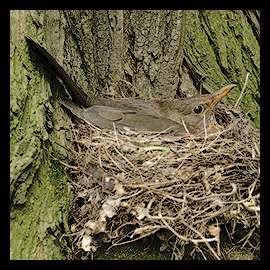 |
Blackbird nest photo: Kazimierz Walasz |
Cooperation: Kazimierz Walasz, Mariusz Cichoń, Rafał Martyka, Anna Dybek (Institute of Environmental Sciences), Artur Jarmołowski, Marlena Lembicz and Artur Rogowski (Institute of Molecular Biology and Biotechnology, Adam Mickiewicz University).
Completed projects:
How interactions with a male affects maternal investment in a polygynous species
The model organism in the study was a captive Japanese quail (Coturix japonica). The project revealed that females anticipation of mating opportunity gives her better control of maternal investment in sons and daughters (Rutkowska & Adkins-Regan 2009). We also determined to what extent any increase in female corticosterone level is specific to actual mating with a male compared to visual and auditory contact with a male, and compared to social interaction with another female (Rutkowska et al. 2011).
Cooperation:Elizabeth Adkins-Regan and Ned Place (Cornell University).
Offspring sex determination: integrating ecological context and proximate mechanism of non-random meiosis in birds
The aim of this project was to describe the proximate mechanisms behind adaptive offspring sex adjustment in birds (Rutkowska & Badyaev 2008). As a model system, I've used the house finch (Carpodacus mexicanus).
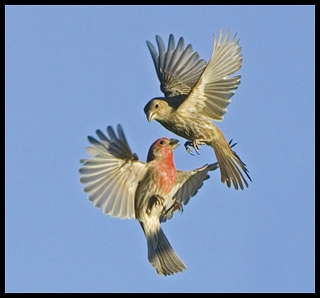 |
House finch pair photo: Alex Badyaev |
Cooperation: Alex Badyaev (University of Arizona).
The effect of testosterone on primary sex ratio and on performance of male and female offspring in the zebra finches (Taeniopygia guttata)
We found the cause-and-effect relationship between maternal androgens and proportion of sons among offspring (Rutkowska & Cichoń, 2006) and showed that elevated androgen level might have negative effects on the mother (Rutkowska et al. 2005). We aslo showed how maternal androgens affect survival, development and reproductive success of male and female offspring (Rutkowska et al. 2007).
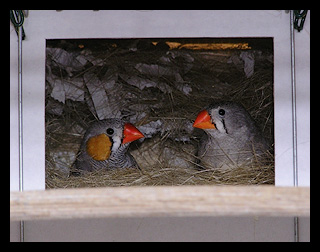 |
Zebra finches in the nest photo: Joanna Rutkowska |
Resources quality and sex allocation in zebra finches (Taeniopygia guttata)
We found that female birds react to the immediate change in food quality during clutch formation by adjusting sex of subsequently laid eggs within a clutch (Rutkowska and Cichoń, 2002). It shows that female birds control offspring sex to the great extend. We also found that the increase of egg mass with the laying sequence compensates for the negative effects of hatching asynchrony. Sex allocation may influence competition among offspring in asynchronously hatching broods (Rutkowska and Cichoń 2005).
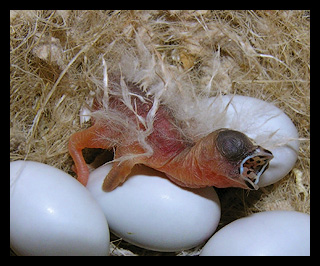 |
Zebra finch hatchling photo: Joanna Rutkowska |
Cooperation: Mariusz Cichoń
Costs of rearing sons versus daughters in the bank vole (Clethrionomys glareolus)
In year 2003 I took part in the studies of maternal investment to male and female offspring in mammals, in the project of Drs Tapio Mappes and Esa Koskela at the Jyväskylä University (Finland). Our results revise the common assumption that in polygynous mammals male offspring receive more resources and that they are more valuable for their mothers (Koskela et al. 2009). Assessing maternal energy budget helped us also to reveal the trade-off between current and future sex allocation in this small mammal (Rutkowska et al. 2011).
Cooperation: Esa Koskela and Tapio Mappes (Jyväskylä University).
d e s i g n e d b y P a w e ł K a p u s t a